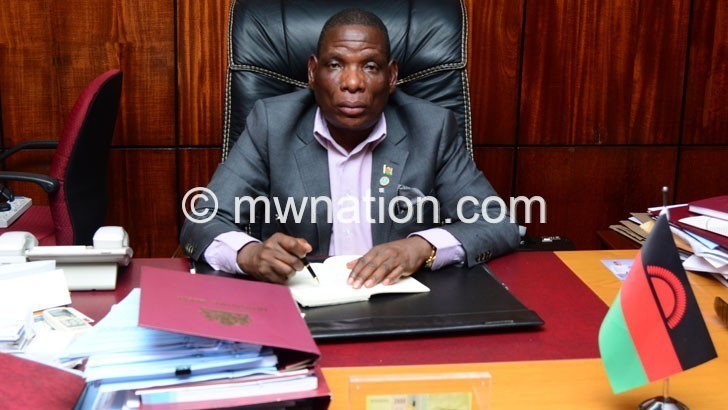IMF to the rescue
The International Monetary Fund (IMF) has committed to give Malawi $150 million (about K110 billion) as a direct response to help the country fight the coronavirus (Covid-19) crisis.
The funds are part of the IMF’s Catastrophe Containment and Relief Trust (CCRT), Rapid Credit Facility (RCF) and balance of payments (BoP) support for Malawi.

Minister of Finance, Economic Planning and Development Joseph Mwanamvekha and IMF Resident Representative Farayi Gwenhamo confirmed the impending fiscal relief in separate interviews with The Nation in Lilongwe last evening.
But Mwanamvekha and Gwenhamo declined to give specific details of the package, saying discussions were still in progress.
However, sources at Treasury privy to the discussion said of the $150 million aggregate earmarked under the RCF, $40 million for CCRT and the remaining $30 million would be disbursed under the three-year arrangement between the IMF and Malawi Government—the Extended Credit Facility (ECF) in form of BoP support.package, $80 million is
The revelations come barely a week after the IMF Executive Board adopted some immediate enhancements to its CCRT to enable the Fund provide debt service relief for its poorest and most vulnerable members, including Malawi. The CCRT enables the IMF to deliver grants for debt relief benefiting eligible low-income countries in the wake of catastrophic natural disasters and major, fast-spreading public health emergencies.
During the interview, Mwanamvekha said besides the IMF, Treasury has also written the country’s other multilateral and bilateral creditors such as the World Bank, African Development Bank (AfDB), African Export-Import Bank—also referred to as Afreximbank, China and India to consider softening their stance on Malawi’s debt payments obligation to them.
He said: “We want them [the creditors] to offer us a moratorium on both principal and interest and we are still discussing that. As a country, we are affected by the outbreak and because of coronavirus, obviously revenue will come down and we are still doing our assessment on that one because the situation keeps on changing every day.”
Mwanamvekha said limited traffic in terms of imports and exports as well as overall limited economic activity will negatively affect the performance of Value Added Tax (VAT), withholding tax and Pay As You Earn (Paye), among others.
But the minister confirmed that the IMF Board is set to meet this Friday for a final determination on the expected debt relief.
He said: “Our country team of the World Bank is also currently conducting an economic analysis to explore various options on the same and so far we know that a Catastrophic Deferred Drawdown Option [CAT-DDO] is available to Malawi which Treasury has already requested for a disbursement.”
On her part, Gwenhamo said in direct response to the Covid-19 crisis, IMF Board has adopted some immediate patient], all the 14 people were locked down in their compound and are being monitored from there.
“We have created facilities to be used as institutional quarantine centres at the Skin Department and Cancer Centre at Kamuzu Central Hospital [in Lilongwe] as well as in Blantyre and Mzuzu.
“In district hospitals, spaces have been cleared in readiness for the coronavirus cases.”
President Peter Mutharika, who announced the first
CCRT which she said will enable Malawi and other poorest countries have some debt service relief.enhancements to its
She said through such a response, IMF hopes that most vulnerable member countries will channel more of their scarce financial resources to their vital emergency medical and other relief efforts.
Said Gwenhamo: “Malawi is set to benefit from this initiative and we are currently discussing with the Malawian authorities on the country-specific parameters, including the size of debt relief.”
Malawi could roughly save about K16 billion per year if both bilateral and multilateral creditors if they positively respond to a recent call by the World Bank and IMF to suspend debt payments of the world’s poorest countries in the wake of the Coronavirus (Covid-19) pandemic.
In the K1.7 trillion 2019/20 fiscal budget, payment of interest on the country’s public debt is projected
at K243.9 billion or 3.9 percent of gross domestic product (GDP).
This represents 8.8 percent increase from the amount paid during the last financial year. Of this total, K15.5 billion is for foreign interest payment, while K228.5 billion is for domestic interest payment.
By December 2019, Capital Hill had paid total interests on loans amounting to K118.5 billion, of which interest on external debt was K7.7 billion while that on domestic debt was K110.7 billion.
According to a joint IMF/World Bank debt sustainability analysis, conducted in September 2019, Malawi’s level of debt stock continues to constrain the country’s room for additional borrowing.
In 2006, Malawi had $2.9 billion of its external debt written off under the Highly Indebted Poor Countries (Hipc) initiative. The cancelled debt represented 90 percent of the country’s foreign debt, leaving Malawi with a $400 million debt burden as of September 2006.
Conditions for the cancellation required the country to channel about K15 billion annually then for 20 years that could have gone towards servicing the debt to support development projects.





